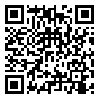BibTeX | RIS | EndNote | Medlars | ProCite | Reference Manager | RefWorks
Send citation to:
URL: http://jdisabilstud.org/article-1-2425-en.html
2- Associate Professor, Psychology Department, Marvdasht Branch, Islamic Azad University, Marvdasht, Iran
3- Professor, Psychology Department, Marvdasht Branch, Islamic Azad University, Marvdasht, Iran
4- Assistant Professor, Psychology Department, Marvdasht Branch, Islamic Azad University, Marvdasht, Iran
Abstract
Background & Objectives: Academic emotions are defined as emotions that are directly related to development activities or the consequences of progress. The classroom is an emotional place; students spend countless hours completing projects, testing, and building social relationships to achieve real-life goals, so educational situations are fascinating. Positive emotions are among the prerequisites of behavioral self-regulation. Self-regulation skills focus on the role of the individual in the learning process, and individuals use their strategies to regulate their cognition. Students who cannot express their desires, when they feel rejected or upset and angry, withdraw or become aggressive instead of expressing their professionalism. Boldness is an effective way to distinguish between withdrawal and aggression. Assertiveness allows you to break free from stereotypes and create dynamism and innovation. This study aimed to compare the effectiveness and sustainability of self-assertiveness and self-regulation training on positive academic emotions of female high school students in Kouhchenar City, Iran.
Methods: The research method was quasi-experimental and employed a pretest-posttest and one-month follow-up design with a control group. The study sample consisted of 90 female volunteer students in three classes of the first secondary high school in Kouhchenar City in the 2018-2019 academic year. Regarding the research's purpose and method, necessary explanations were given to the students, and they were requested to complete the consent forms if they wished to participate in this research (the criteria for entering the samples into the research). The criteria for leaving samples from the study were absence during the execution of one of the tests and absence of more than two sessions in the training course. Three groups were prepared and randomly assigned in self-regulation, self-assertiveness, and control. Students in the experimental groups received training sessions related to the group title for 8 sessions, and the control group continued with their normal class schedules. The Achievement Emotions Questionnaire (Pekrun, 2005) was used in the pretest, posttest, and follow-up. Data analysis was done using descriptive (mean, standard deviation, and graph) and inferential statistics (analysis of variance with repeated measures and Bonferroni's post hoc test) in SPSS version 23 statistical software. The significance level of statistical tests was 0.05.
Results: Results showed that in the control group, there was no significant difference between the different test stages in the emotions of pleasure and pride (p>0.05). However, in the experimental groups, there was a significant increase in the average emotions of pleasure and pride (p=0.001) in the posttest and follow-up stages compared to the pretest. The effectiveness of self-regulation and self-assertiveness training on increasing pleasure and pride was stable over time (p>0.05). There was a significant difference between the control and experimental groups in the emotions of pleasure and pride (p<0.05). A significant difference was observed between the experimental groups (p<0.05) in the feelings of pleasure and pride.
Conclusion: Based on the findings of the research, self-assertiveness and self-regulation training effectively increase students' positive academic emotions and are stable over time. In comparison, self-assertiveness training is more effective on the emotion of pleasure, and self-regulation training is more effective on the emotion of pride.
| Rights and permissions | |
 |
This work is licensed under a Creative Commons Attribution-NonCommercial 4.0 International License. |



